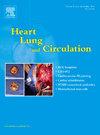Efficacy and Safety of Desmopressin in Terms of Bleeding and Transfusion in Cardiac Surgery With Cardiopulmonary Bypass: A Systematic Review and Meta-Analysis
IF 2.2
4区 医学
Q2 CARDIAC & CARDIOVASCULAR SYSTEMS
引用次数: 0
Abstract
Bleeding and transfusion during cardiac surgery are major sources of complications. Surgery and cardiopulmonary bypass can induce coagulopathy, including platelet dysfunction. Desmopressin has been shown to reduce bleeding and transfusion requirements, although with conflicting results. This study aimed to systematically evaluate the available evidence regarding the efficacy and safety of desmopressin in cardiac surgery with cardiopulmonary bypass.
The Embase, MEDLINE, Cochrane Central, Web of Science, and ClinicalTrials.gov databases were searched for prospective studies comparing desmopressin with placebo in cardiac surgery with cardiopulmonary bypass. A meta-analysis with bleeding at 24 hours as the primary outcome and the amount and incidence of blood product transfusions as secondary outcomes was performed. Safety outcomes included re-exploration rate, thromboembolic events, and mortality.
Thirty-four (34) studies comprising 2,523 patients were included. Bleeding at 24 hours was reduced in the desmopressin group (weighted mean difference, 96.20 mL; 95% confidence interval [CI] −148.44 to −43.96; p=0.0003 with heterogeneity [I2]=76%). The amount of blood products transfused (red blood cells) was reduced in the desmopressin group (standardised mean difference [SMD], −0.32; 95% CI −0.58 to −0.05). No significant difference was found for transfusion of platelets (SMD, −0.16; 95% CI −0.58 to 0.26) or fresh frozen plasma (SMD, −0.30; 95% CI −0.67 to −0.06). No significant differences were observed between the two groups with respect to safety outcomes.
Results of the present meta-analysis demonstrated that desmopressin reduced blood loss and the amount of red blood cell transfusions after cardiac surgery. However, this result should be interpreted with caution, given the considerable heterogeneity among the studies.
去氨加压素在体外循环心脏手术出血和输血方面的疗效和安全性:一项系统综述和荟萃分析。
心脏手术中的出血和输血是并发症的主要来源。手术和体外循环可引起凝血功能障碍,包括血小板功能障碍。去氨加压素已被证明可减少出血和输血需求,尽管结果相互矛盾。本研究旨在系统评价去氨加压素在体外循环心脏手术中的有效性和安全性。我们检索了Embase、MEDLINE、Cochrane Central、Web of Science和ClinicalTrials.gov数据库,以比较去氨加压素与安慰剂在体外循环心脏手术中的前瞻性研究。以24小时出血为主要结局,以输血量和输血发生率为次要结局进行荟萃分析。安全性指标包括再探查率、血栓栓塞事件和死亡率。34项研究包括2523例患者。去氨加压素组24小时出血减少(加权平均差为96.20 mL;95%置信区间[CI] -148.44 ~ -43.96;p=0.0003,异质性[I2]=76%)。去氨加压素组血液制品(红细胞)输注量减少(标准化平均差[SMD], -0.32;95% CI -0.58 ~ -0.05)。输注血小板无显著差异(SMD, -0.16;95% CI -0.58至0.26)或新鲜冷冻血浆(SMD, -0.30;95% CI -0.67 ~ -0.06)。在安全性结果方面,两组之间没有观察到显著差异。本荟萃分析的结果表明,去氨加压素减少了心脏手术后的失血量和红细胞输注量。然而,考虑到研究之间的相当大的异质性,这一结果应该谨慎解释。
本文章由计算机程序翻译,如有差异,请以英文原文为准。
求助全文
约1分钟内获得全文
求助全文
来源期刊

Heart, Lung and Circulation
CARDIAC & CARDIOVASCULAR SYSTEMS-
CiteScore
4.50
自引率
3.80%
发文量
912
审稿时长
11.9 weeks
期刊介绍:
Heart, Lung and Circulation publishes articles integrating clinical and research activities in the fields of basic cardiovascular science, clinical cardiology and cardiac surgery, with a focus on emerging issues in cardiovascular disease. The journal promotes multidisciplinary dialogue between cardiologists, cardiothoracic surgeons, cardio-pulmonary physicians and cardiovascular scientists.
 求助内容:
求助内容: 应助结果提醒方式:
应助结果提醒方式:


